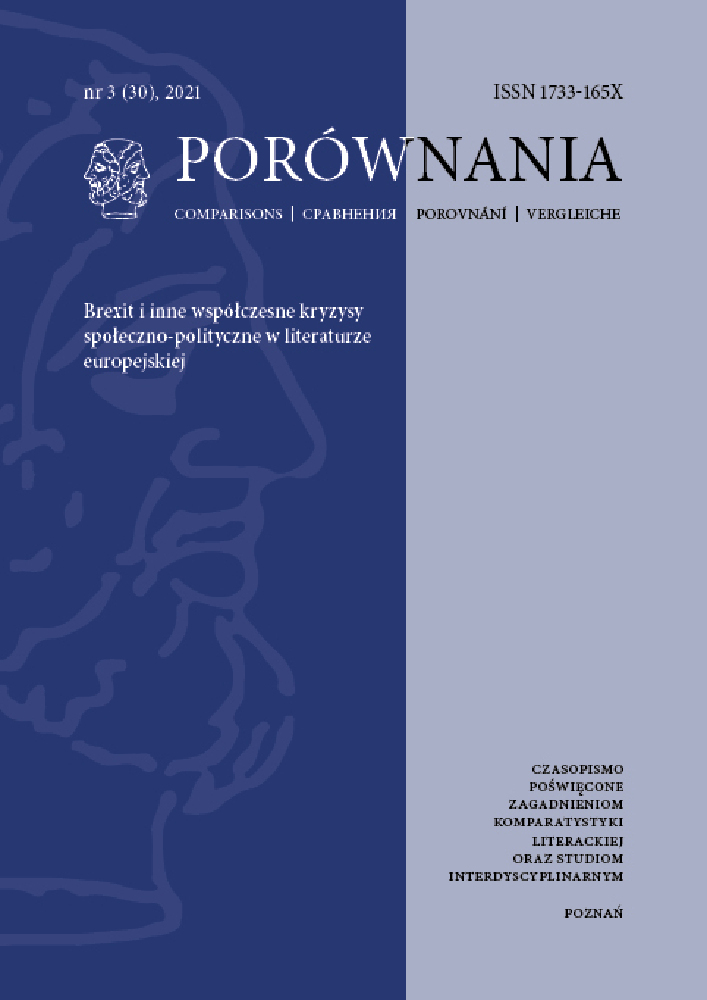Abstract
Over the past decade, many democratic countries have been caught off guard by their own unpreparedness in dealing with the threats associated with the spread of social media. Surveillance, disinformation, propaganda or hate speech have all become real threats caused by the largest social media platforms. Literature has also reacted to this phenomenon, most notably by providing dystopian visions of the further uncontrolled impact of social media. The analysis focuses on two novels recently published in the field of Czech and Slovak literatures—the first one by Czech writer David Zábranský Logoz or Robert Holm a Danish Marketer (2019) and the second one by Slovak writer Michal Hvorecký Troll (2017). The core aim of the analysis is to search for an answer to the question whether the literature limits itself only to descriptions of apocalyptic visions, or whether it shows possible recovery plans.
References
Barnidge Matthew (2017), Exposure to Political Disagreement in Social Media Versus Face-To-Face and Anonymous Online Settings, „Political Communication”, nr 2, s. 302−321, https://doi.org/10.1080/10584609.2016.1235639.
Bennett Lance W., Livingston Steven (2018), The Disinformation Order: Disruptive Communication and the Decline of Democratic Institutions, „European Journal of Communication”, nr 2, s. 122−139, https://doi.org/10.1177/0267323118760317.
Bennett Lance W., Pfetsch Barbara (2018), Rethinking Political Communication in a Time of Disrupted Public Spheres, „Journal of Communication”, nr 2, s. 243−253, https://doi.org/10.1093/joc/jqx017.
Bimber Bruce, Gil de Zúñiga Homero (2020), The Unedited Public Sphere, „New Media & Society”, nr 4, 700–715, https://doi.org/10.1177/1461444819893980.
Boxell Levi, Gentzkow Matthew, Shapiro Jess (2017), Greater Internet Use Is Not Associated with Faster Growth in Political Polarization among US Demographic Groups, „Proceedings of the National Academy of Sciences”, nr 40, s. 10612−10617, https://doi.org/10.1073/pnas.1706588114.
Bińczyk Ewa (2018), Epoka człowieka. Retoryka i marazm antropocenu, PWN, Warszawa.
Couldry Nick (2017), Surveillance-Democracy, „Journal of Information Technology & Politics”, nr 2, s. 182–188, https://doi.org/10.1080/19331681.2017.1309310.
Czaplińska Joanna (2002), Dystopia: konstatacja totalitaryzmu czy ostrzeżenie przed globalizacją – na podstawie literatury czeskiej i polskiej, w: Narodowy i ponadnarodowy model kultury. Europa Środkowa i Półwysep Bałkański, Wydawnictwo Naukowe UAM, Poznań, s. 127−135.
Fialová Alena, red. (2014), V souřadnicích mnohosti: česká literatura první dekady jednadvacátého století v souvislostech a interpretacích, Academia, Praha.
Harari Yuval Noah (2018), 21 lekcji na XXI wiek, przeł. Michał Romanek, Wydawnictwo Literackie, Kraków.
Hrtánek Petr (2004), Negativní utopie v české próze druhé poloviny 20. století: pokus o znakovou identifikaci žánru, Ostravská univerzita, Ostrava.
Hvorecký Michal (2018), Troll, przeł. ze słowackiego na czeski Martina Bekešová, Argo, Praha.
Jowett Garth S., O’Donnell Victoria (2014), Propaganda & Persuasion, Sage, London.
Kirsch Helen, Welzel Christian (2019), Democracy Misunderstood: Authoritarian Notions of Democracy around the Globe, „Social Forces”, nr 1, s. 59−92, https://doi.org/10.1093/sf/soy114.
Klein Naomi (2018), Nie to za mało. Jak stawić opór polityce szoku i stworzyć świat, jakiego nam trzeba, przeł. Marek Jedliński, Muza, Warszawa.
Klemperer Victor (2014), LTI. Notatnik filologa, przeł. Juliusz Zyblewicz, Aletheia, Warszawa.
Koc-Michalska Karolina i in. (2020), Public Beliefs about Falsehoods in News, „The International Journal of Press/Politics”, nr 3, s. 447−468, https://doi.org/10.1177/1940161220912693.
Miller Michael L., Vaccari Cristian (2020), Digital Threats to Democracy: Comparative Lessons and Possible Remedies, „The International Journal of Press/Politics”, nr 3, s. 333−356, https://doi.org/10.1177/1940161220922323.
Negroponte Nicholas (1995), Being Digital, Knopf Doubleday Publishing Group, New York.
Passia Radoslav, Taranenková Ivana, red. (2014), Hľadanie súčasnosti: slovenská literatúra začiatku 21. storočia, Literárne informačné centrum, Bratislava.
Shapiro Andrew (1999), The Control Revolution: How the Internet Is Putting Individuals in Charge and Changing the World We Know, Perseus Books, New York.
Stier Sebastian i in. (2020), Populist Attitudes and Selective Exposure to Online News: A Cross Country Analysis Combining Web Tracking and Surveys, „The International Journal of Press/Politics”, nr 3, s. 426−446, https://doi.org/10.1177/1940161220907018.
Stoycheff Elisabeth (2016), Under Surveillance: Examining Facebook’s Spiral of Silence Effects in the Wake of NSA Internet Monitoring, „Journalism & Mass Communication Quarterly”, nr 2, s. 296−311, https://doi.org/10.1177/1077699016630255.
Stoycheff Elisabeth (2020), Relatively Democratic: How Perceived Internet Interference Shapes Attitudes about Democracy, „The International Journal of Press/Politics”, nr 3, s. 390–406, https://doi.org/10.1177/1940161220909741.
Sulík Ivan (1997), Literárne antiutópie ako príznak postmoderny, w: Od moderny k postmoderne, red. Žilka Tibor, Univerzita Konštantína Filozofa v Nitre, Nitra, s. 135–145.
Toffler Alvin (1986), Trzecia fala, przeł. Ewa Woydyłło, PIW, Warszawa.
Wettstein Martin i in. (2020), Measuring Populism across Nations: Testing for Measurement Invariance of an Inventory of Populist Attitudes, „The International Journal of Press/Politics”, nr 3, s. 284–305, https://doi.org/10.1093/ijpor/edz018.
Zábranský David (2019), Logoz aneb Robert Holm markéter dánský, Větrné mlýny, Praha.
License
Utwory opublikowane w czasopiśmie „Porównania”, na platformie Pressto należącej do Uniwersytetu im. Adama Mickiewicza w Poznaniu są udostępniane na licencji Creative Commons Uznanie autorstwa - Bez utworów zależnych 4.0 Międzynarodowe (CC BY-ND 4.0)
Tym samym wszyscy zainteresowani są uprawnieni do korzystania z utworów opublikowanych pod następującymi warunkami:
-
uznania autorstwa — czyli obowiązek podania wraz z rozpowszechnianym utworem informacji o autorstwie, tytule, źródle (odnośniki do oryginalnego utworu, doi) oraz samej licencji
-
bez utworów zależnych — remiksując, przetwarzając lub tworząc na podstawie utworu, nie wolno rozpowszechniać zmodyfikowanych treści.
-
brak dodatkowych ograniczeń — nie można korzystać ze środków prawnych lub technologicznych, które ograniczają innych w korzystaniu z utworu na warunkach określonych w licencji.
Uniwersytet im. Adama Mickiewicza w Poznaniu zachowuje prawo do czasopisma jako całości (układ, forma graficzna, tytuł, projekt okładki, logo itp.).
Autor zachowuje prawa majątkowe, ale udziela zgody Uniwersytetowi im. Adama Mickiewicza w Poznaniu na wykorzystanie dzieła. Autorzy tekstów zakwalifikowanych do publikacji proszeni są o wypełnienie podpisanie i przesłanie umowa (PL) agreement (EN)
Agreement for granting a royalty-free license to works with a commitment to grant a CC sub-license





